Skills for the development of the connected car
Steven Forth is a Co-Founder of TeamFit. See his Skill Profile.
The automotive industry has entered the most disruptive change since Henry Ford standardized mass production and gave people the car they wanted and could afford (as long as it was black). Autonomous cars. Hybrid and then electric cars. Cars that are part of the Internet of Things. Cars designed with parametric software powered by artificial intelligence. New brands... New marketing models... New sales models... It is hard to think of some part of the automotive industry that is not undergoing disruptive change.
What skills will people and companies in the automotive industry need to thrive in this rapidly changing environment?
To get some insight into this TeamFit surveyed the skills of the Connected Car Group on LinkedIn. We also interviewed a number of people who work on automotive innovation to deepen our understanding of the skill trends in this sector.
The Connected Car Group on LinkedIn currently has just over 4,700 members. We pulled a random sample of 500 people and looked at their experience and skills. This is a diverse international group. It is about 50% from the US (most LinkedIn groups are dominated by US members) and 40% European (there is a lot of research and development into the connected car happening in Europe). There are also people from China (under-represented given its growing importance in research and manufacturing, and as a market), India, Brazil, Japan (also under-represented given all the work happening in Japan) and a smattering of other countries, including Canada, Brazil and South Africa.
We ran the sample's skills through TeamFit to organize and analyze them. The sample had an impressive set of skills, 2579 distinct skills in total. These were well distributed across the TeamFit default categories of Business, Technical, Tool, Domain, Foundational (skills used to build other skills and Social (skills used to work with others). To our surprise, it was business skills that dominated. This may reflect the nature of LinkedIn's membership or the growing maturity of Connected Cars as a business opportunity, probably a combination of both. Do not take the expertise ratings too seriously here. TeamFit's algorithms are sceptical about the use of LinkedIn data to gauge expertise.
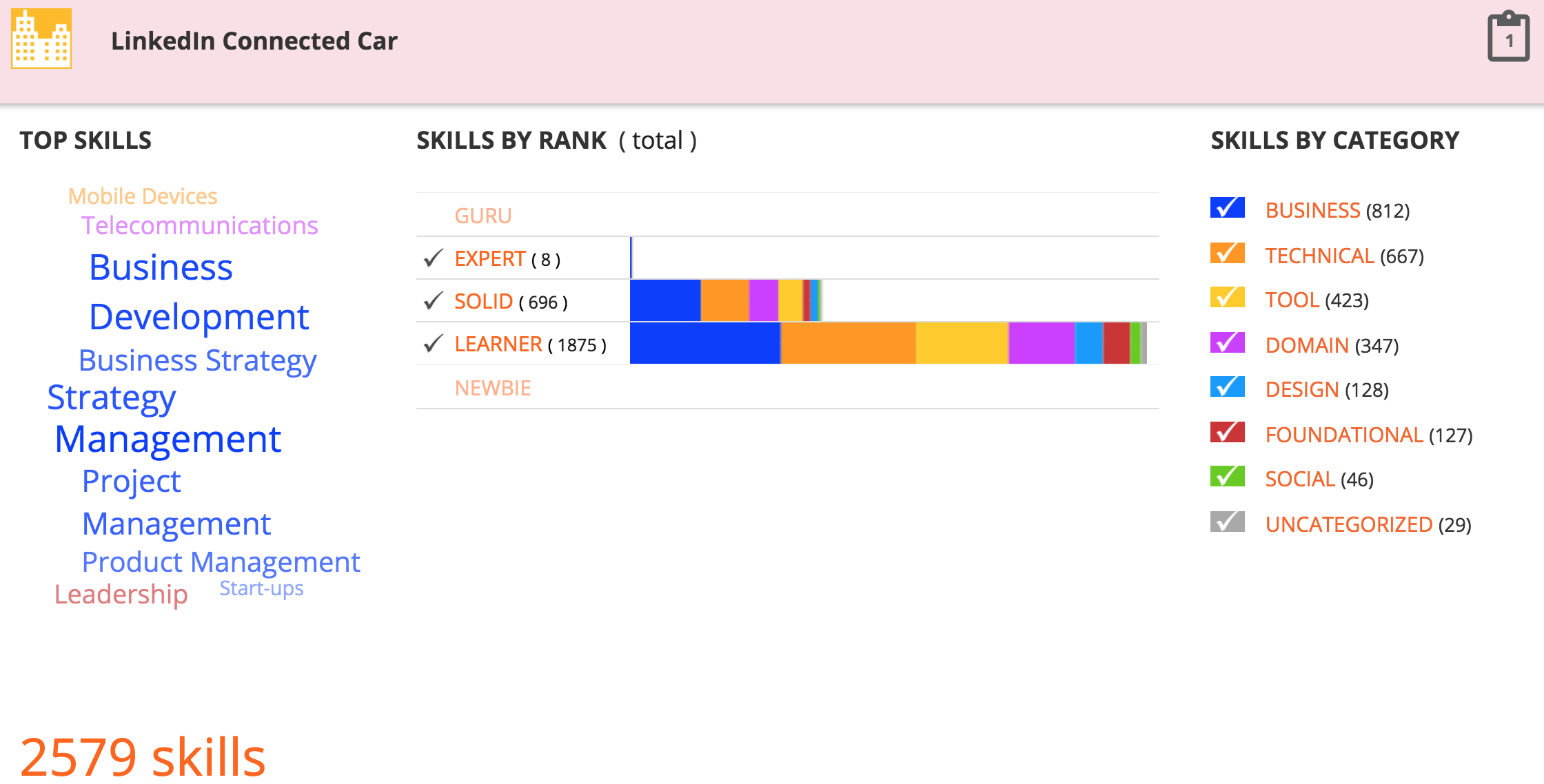
Let's look a bit deeper here. Filtering on Technical skills gives us the following picture. At this level, it looks as though the Connected Car is a mashup of embedded systems, mobility and the cloud.
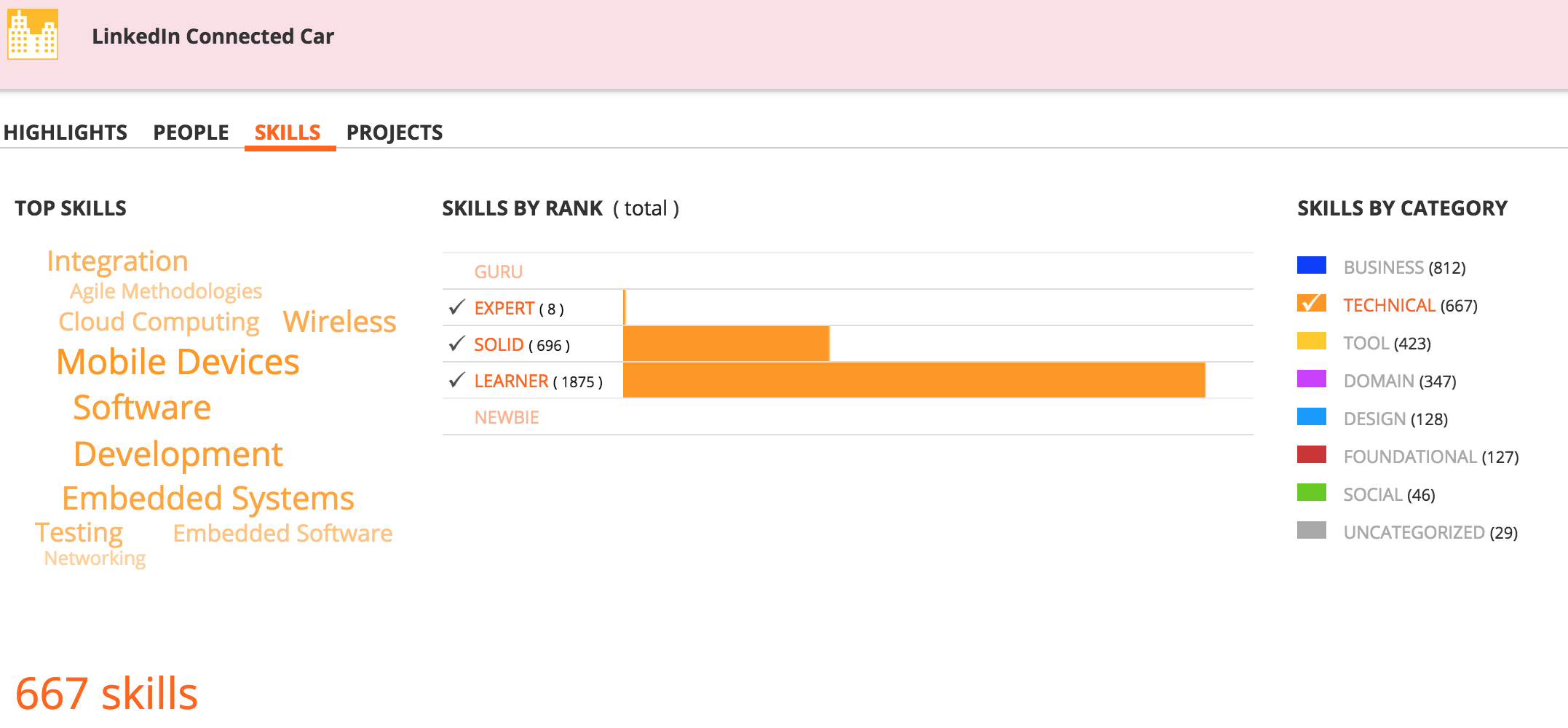
A lot of different tools are used with these technical skills. I was surprised by the prevalence of Microsoft technologies. Probing further with some of the people doing embedded engineering at VentureLab (where TeamFit is located) I found a lot of people using C for embedded systems. I am seeing Matlab show up in a lot of skill profiles recently and I am thinking to put it into my own learning plan for 2018!
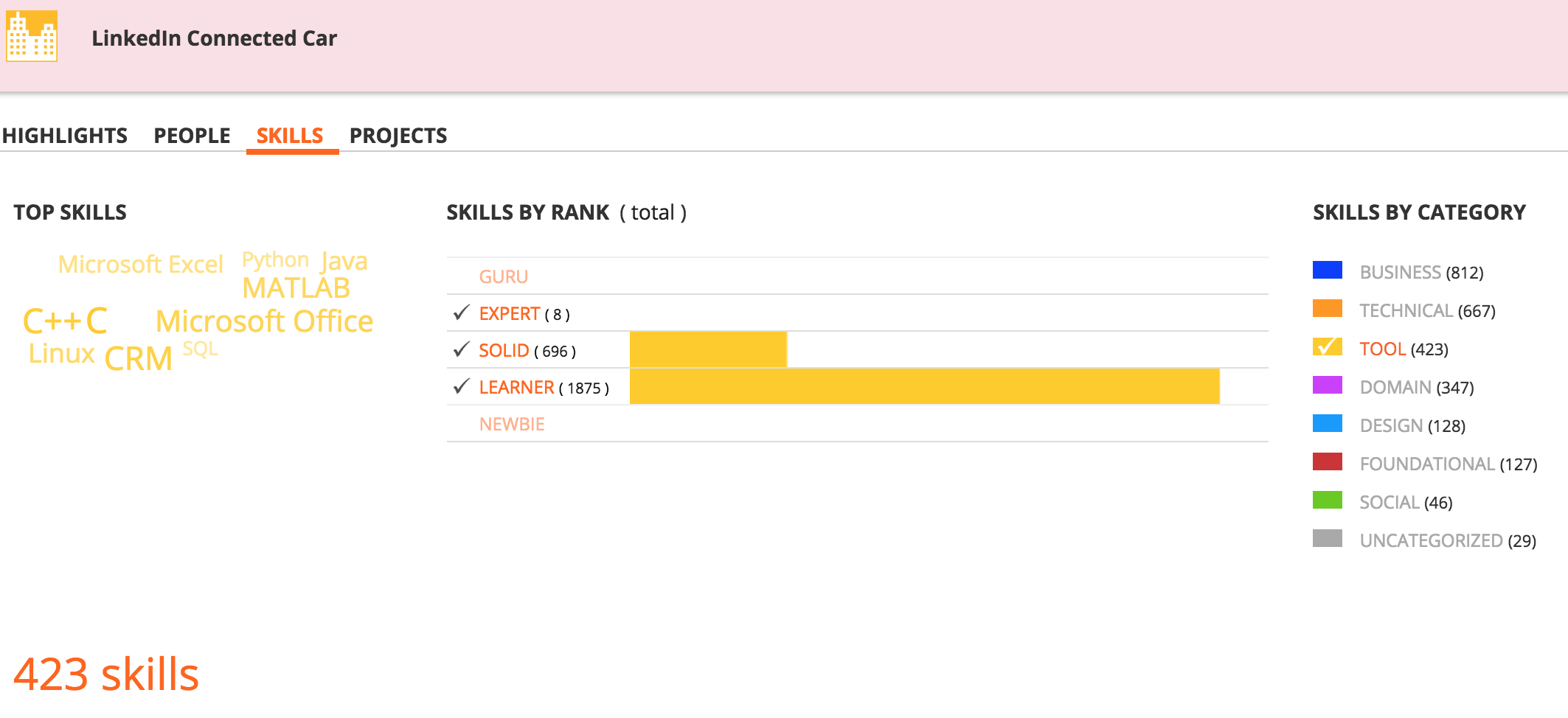
Domain skills are the areas where skills are being applied, generally industries or general areas on inquiry. Focusing in on the domain skills finds the same mashup we noted above, with the addition of manufacturing (that is good, someone has to make these things, a car is a manufactured thing and some of the innovators in the area have been struggling to scale up actual production).
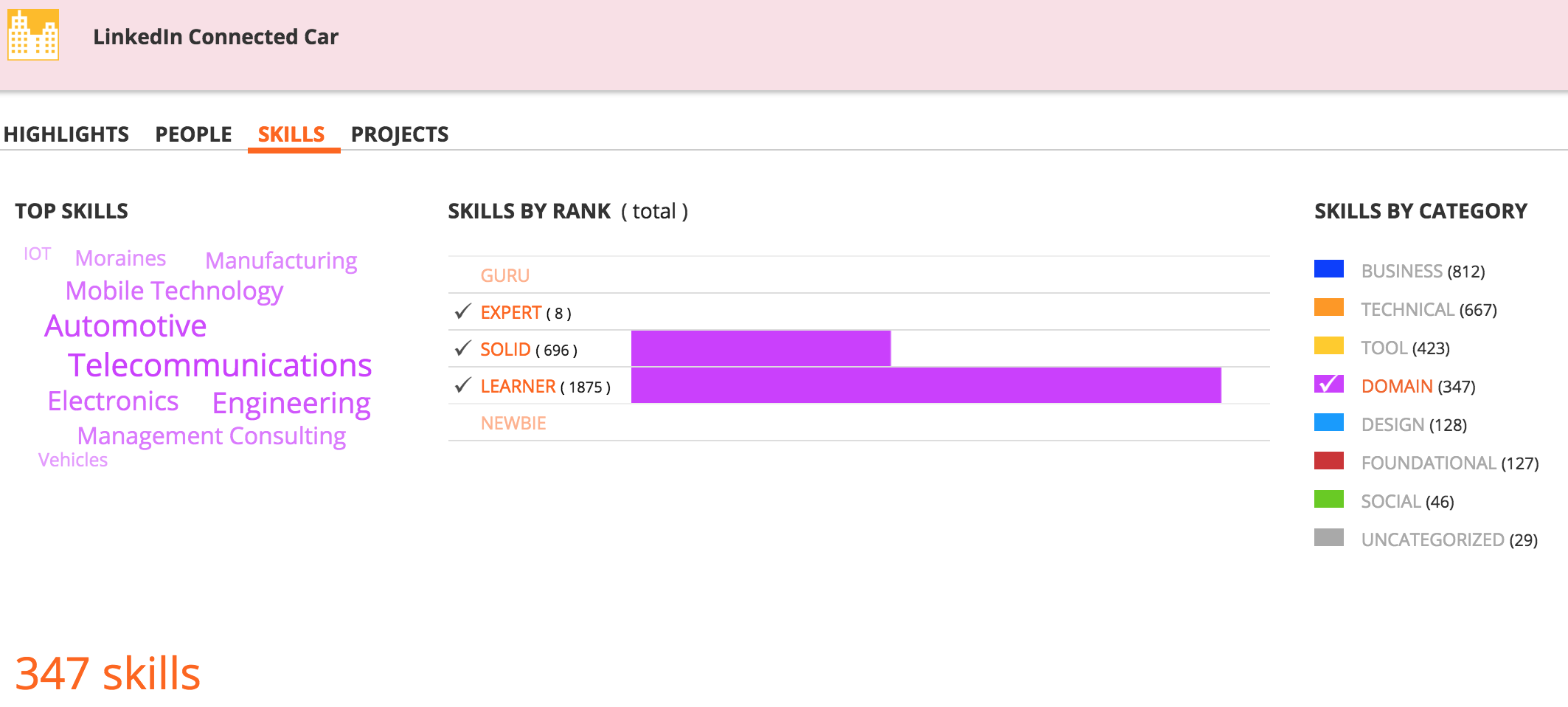
The Connected Car group has a strong set of Design skills. This may seem intuitively obvious but there are actually relatively few groups that combine a rich set of technical and design skills, even though that is the future of many industries. Scrolling down into the long tail of skills, there were even a few people with Storytelling as a skill. The importance of storytelling in introducing innovation is sometimes underplayed. As the connected car moves into the market this will be an important supporting skill.
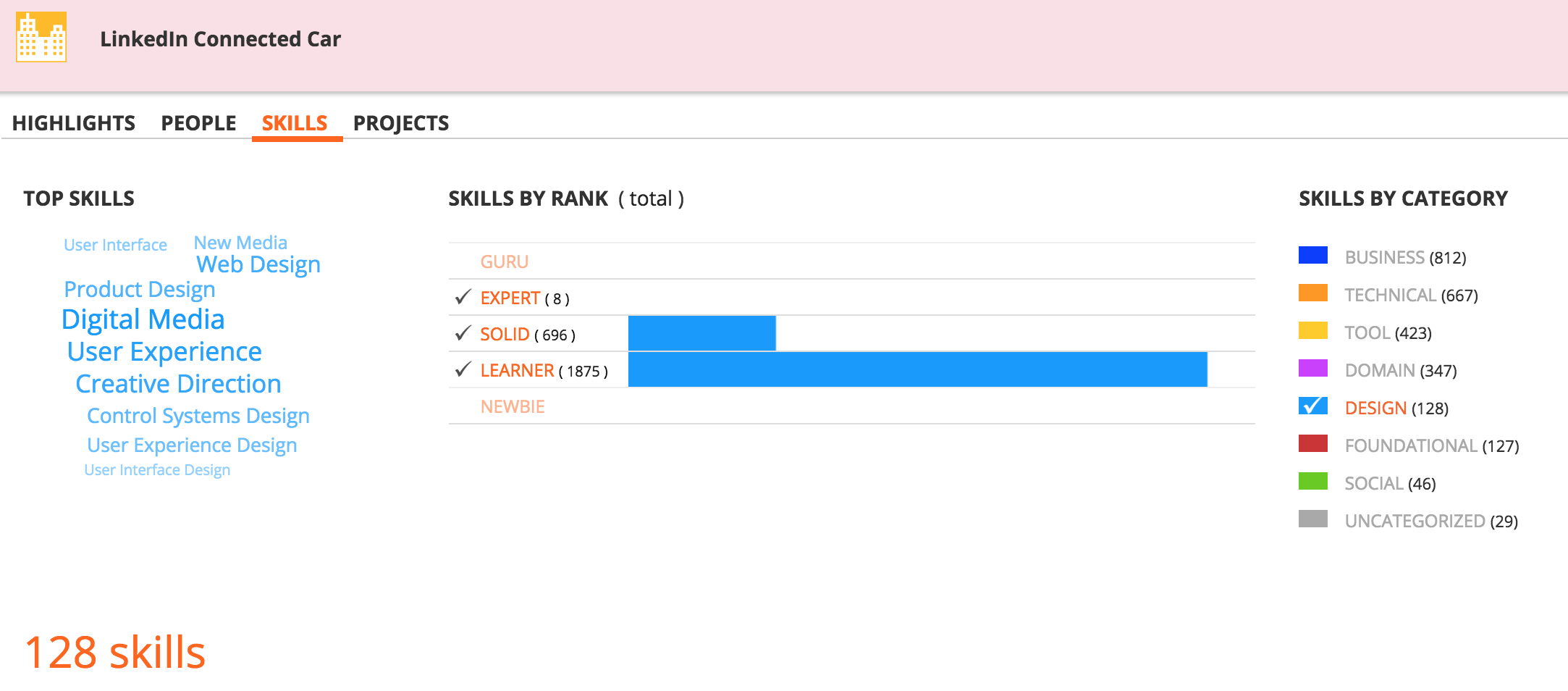
Finally, let's look at Foundational skills. These are the skills used to build new skills, and in a space changing as quickly as the connected car they may be the most important category.
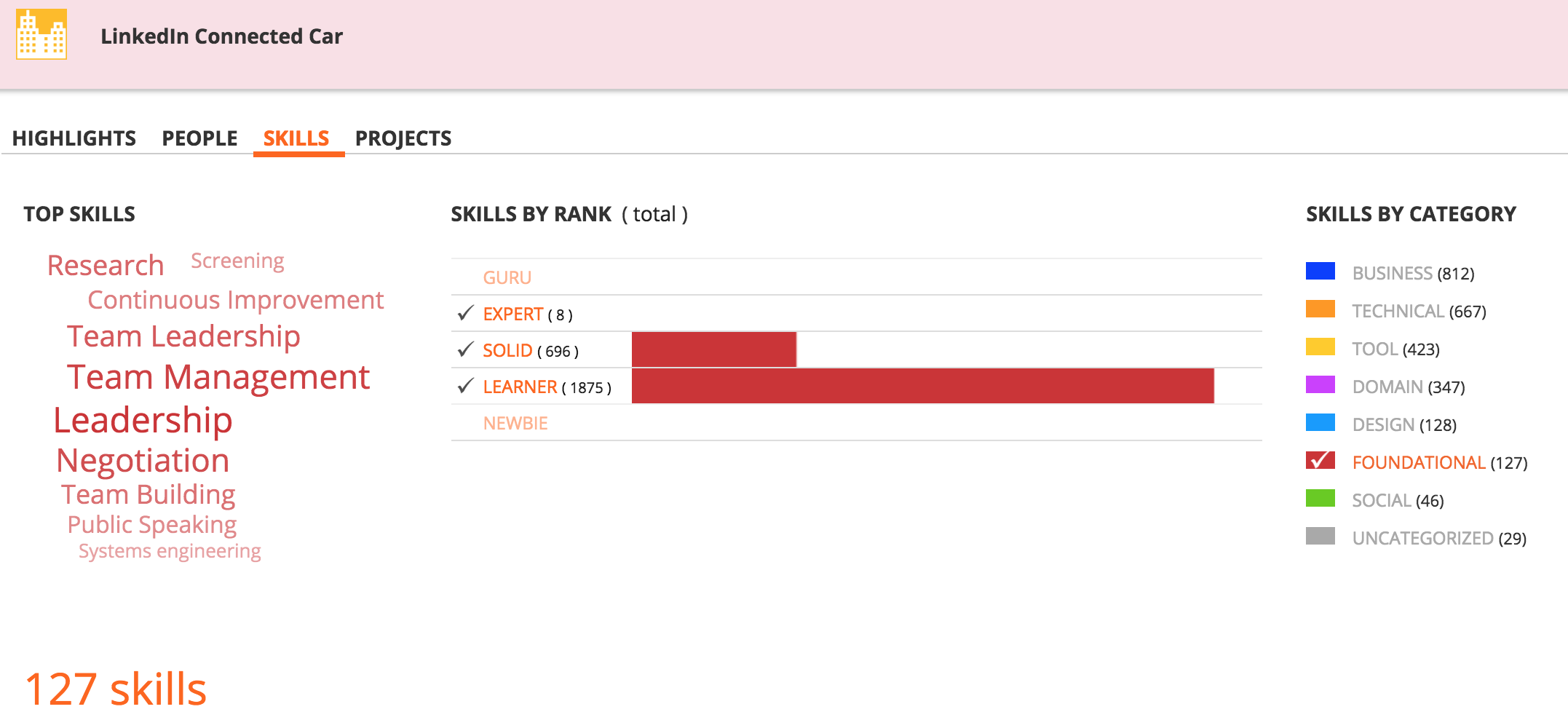
I was expecting to find more mathematical skills here. They are there in the long tail, but not to the extent I had expected (but then I skew towards math as a foundational skill as I personally struggle with mathematics). What we did find is a focus on teams and team building (the TeamFit system considers these Foundational skills rather than Social Skills). This makes sense given that connected car requires the development of cross-functional teams.
Thinking about the future course of connected cars (and Internet of Things projects generally), integrative skills are going to be critical. These are the skills that allow one to combine different areas of expertise (it is not currently a category on TeamFit but it is an area we are investigating). I am currently reading Jennifer Riel and Roger Martin's excellent book Creating Great Choices (HBRP 2017). This book has a lot to teach us about how we can develop our own integrative skills. It is a good holiday read (people on my team and in my family are going to get copies).
In any group of people we find clusters of skills. We ran our clustering algorithms on this data set (we can cluster things like 'similar people' 'similar projects' 'similar skills'). Here we found seven non overlapping groups. Let's look at the top three. (Note that the more feint a skill is, the less it contributes to distinguishing the cluster from the overall Connected Car group. This approach to skill clustering was developed by David Botta, see his skill profile.)
The largest group was technical and most likely does the embedded systems engineering. TeamFit CTO Lee Iverson (see his skill profile) will be glad to see Computer Vision sneak in here as that is what he has his Ph.D. in (a lot of current machine learning technology comes from people trying to solve machine vision problems).

The second cluster is more diverse, but likely represents people coming from the telecommunications and mobility sector. This cluster is a bit more product and business oriented.

The next cluster is also business oriented. I suspect it includes a lot of the consultants that buzz around any new and innovative space.

With the fourth cluster we see the marketing people showing up. This suggest that connected car really is a commercial opportunity as these people tend not to appear in innovation clusters until the go-to-market stage.

The other clusters are smaller, the next, with 25 members is the recruiters (these people are everywhere on LinkedIn). Then there is a group of 20 people with primarily manufacturing skills. It is interesting that the manufacturing cluster is so small. This probably reflects the research, development and marketing skew of this LinkedIn group, but it does make one think about the importance of manufacturing to the changes that are coming to us.
This research is based on a very narrow data set. Generally TeamFit uses many more types of data to build skill maps, everything from project reports, to patents, to résumés and social media feeds. But even this small data set was able to give us some insights.
Does your organization have the skills needed to deliver on the huge business opportunity of the connected car?


